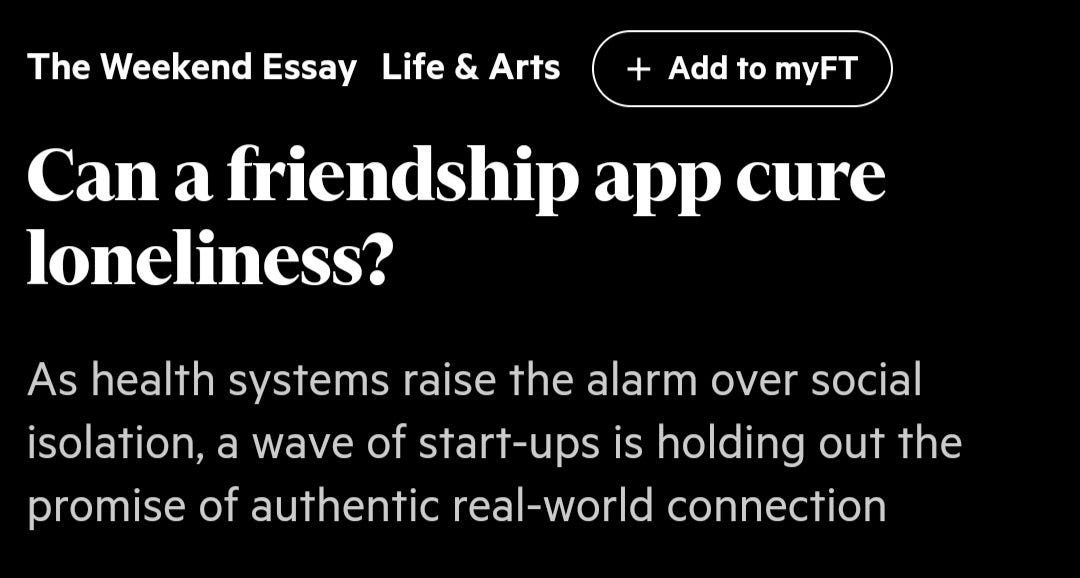Talk to me. Please.
Most apps are solutions in search of a problem; friendship apps are a problem responding to a problem.
In an act of pre-emptive satire – or, like the US invasion of Iraq, was it in fact preventative? – I posted the other day about the notion of a ‘Friendship Party’. It’s good I suppose that the existence of a loneliness crisis has entered public consciousness. But I’m fairly confident that the fact it has grabbed the attention of civil servants and policymakers is bad.
To be libertarian about it, I don’t think the state can ‘resolve’ problems of subjectivity. To be less libertarian about it, the best the state can do is provide resources that allow citizens to flourish somewhat.
But we know states don’t do that anymore (to the extent they ever did, briefly and in limited fashion in the postwar era in advanced economies). Look inside policymakers’ toolkits and you won’t see the hammers and pliers used for the construction of infrastructure, both hard and soft (railways and after-school clubs). You’ll see instead something that looks like the advanced surgery tools in David Cronenberg’s Crimes of the Future (2022): bioware, for the engineering of human behaviour.
It was bad when governments all thought their jobs was to make us happy. They’ve given up on this, but the attempt to create therapeutic relationship between state and citizen remains (see upcoming Bungacast episode with Ashley Frawley for more on this). It won’t be any better if they try to make us make friends. (Writing that sentence put my mom’s voice in my head, asking little Alex if he had made any new friends today at school – a fact which should underline that the state today is not paternal but maternal.) Especially not if their motivation and the lens through which they perceive the issue is medical or therapeutic.
Where any state attempt to ‘resolve’ problems of human (inter)subjectivity is bound to be clumsy and embarrassing, the private sector’s is likely to be insidious: sort of appealing at the start, maybe promising, but ultimately destructive. Enter TimeLeft, a sort of Tinder but for making friends. It matches you up with multiple random others for a dinner date, and gives you icebreaker conversation prompts (cringe). This app, and the crisis it responds to, is the subject of a Weekend Essay in the FT today.
So many apps today are solutions in search of a problem. TimeLeft has the noble distinction of being a problem responding to a problem. And there is a problem.
My heart bleeds for those lacking in friendships. You’ve all seen the figures, and they get worse the younger the age bracket. It’s a sharp intake of breath for me every time I read that, in the US for instance, one in five millennials say they have no friends at all. No friends at all. And obviously the m̸o̸t̸h̸e̸r̸f̸u̸c̸k̸i̸n̸g̸ lockdowns only made it worse. Maybe I’m extra sensitive to it because I had one or two periods in childhood with no mates, and they sucked, and they marked me. Whenever I spend a couple of weeks for whatever reason without meeting up with friends, I get a bit depressed, unmotivated. A few beers on a Friday with the boys and I’m instantly renewed, full of love for the world. What must it be like for those who simply don’t have this in their life?
So an app like TimeLeft certainly has its appeal and, hey, it might help some lonely people meet other people. Those other people probably won’t become their friends. But they might meet other people through those randos they met via the app and become friends with them. And that’s good.
But its wider social effect can only be that people come to depend ever more on these artifices for making connections and forget how to do it the old-fashioned way. This is rather like what sociologist Zygmunt Bauman describes as “social deskilling”, in an analogy with labour deskilling (whereby management’s control of knowledge and introduction of new technology leaves workers with fewer capacities and dependent on machines to do their job – and increasingly dependent on capitalists who detain the technology).
As Bauman wrote back in his 2007 book, Consuming Life, “as the skills needed to converse and seek understanding dwindle, what used to be a challenge to be confronted point blank and then coped with turns increasingly into a pretext for breaking off communication, for escaping and burning bridges behind you.”
The company of flesh-and-blood human beings makes the habitual clients of internet dating agencies, properly primed by commodity market practices, feel ill at ease. The sorts of commodities with which they have been trained to socialize are for touching, but have no hands to touch, are laid bare for examination, but do not return the look and do not demand the look to be returned and so abstain from exposing the viewer to scrutiny, while placidly exposing themselves to the client’s examination; one can examine them all over without fearing their scrutiny of one’s own eyes, those windows into the soul’s most private secrets. Internet agencies derive most of their attraction from recasting the sought-after human partners as the kinds of commodities which well-trained consumers are used to confronting and know how to handle. The more seasoned and ‘mature’ their clients become, the more they are taken aback, confused and embarrassed when they come ‘face to face’ and discover that the looks must be reciprocated and that in ‘transactions’ they, the subjects, are also objects.
The reference to “internet dating agencies” already sounds terribly quaint, but the point remains valid. The loneliness crisis and the sex recession surely are part of the same whole. Moreover, it is not just that we forget how to “return the gaze”, but that we lose the skills and knowledge of how to meet new people, to strike up conversations with strangers and so on.
Of course, there is something more fundamental underlying this. For instance, we may be simply meeting fewer people, reducing the opportunities to make acquaintances – and to then turn those into friendships or romances or both – if we work from home, do distance-education courses, and get our dose of sociability by interacting with distant others via multiplayer video games.
The FT essay also supplied another moment of cringe:
The app, which algorithmically matches six people to go for a meal together, seemed a better option than staying in. So, on Valentine’s Day, I arrive at Americana, a restaurant just off London’s Piccadilly Circus with a southern US theme. The two-for-one house cocktail, very pink and very sweet, is conspicuously named “Till the End of Time”. A singer in a nylon flamenco dress performs covers of love songs, urging the seated diners to join in. They do not.
It’s kind of hilarious that the journalist ended up in what might very well be the worst restaurants in London. I don’t know it, never heard of it, but judging by its location, its theme (the fact it has a theme), and the gimmicky entertainment, I’d say there’s a high probability it is awful. It sums up the growing awfulness of all major cities across the West (I’m guessing it’s because the rent is too damn high).
But I’m not here to sneer at city-centre tourist traps. The issue is that the replacement of what I call ‘vernacular establishments’ by these sorts of places, into which you cannot casually drop, is probably complicit with the “loneliness crisis”. What Ray Oldenburg called “third places” are disappearing across many Western cities, though anecdotally it seems far far worse in Anglo countries, and especially in the USA. By coincidence exactly the same places where the indices on friendship look the worst.
I feel fortunate to live in a country, and especially a city – São Paulo, Brazil – where ‘vernacular establishments’ are a dime a dozen. Here they’re botecos and lanchonetes (bars and diners) and they’re always available to just go to and eat or drink or just while away the hours. Will you make real friends there? Maybe, maybe not. But places like this are serendipity factories, so there’s always a chance.

Algorithms can, if they want to, introduce serendipity. But mostly they don’t because they want to be smart, and not just be a digital roll of the dice like Omegle or Chatroulette (which became pornified the second they were born anyway). But even if something like TimeLeft does indeed throw you together with perfect strangers for dinner, they’re still holding your hand through the experience. And so through repeated recourse to these apps we become ever more socially deskilled, and a vicious cycle can clearly emerge: the disappointment of an awkward failure at chatting someone up can easily lead to fugue back to online.
I doubt many will be buying whatever the state is selling when it says it wants to resolve the loneliness crisis. We don’t expect much from Government Mommy. But we should probably also let go of Big Tech Mommy’s apron strings too.







dating apps at least notionally depend on the the consumers imagination of eventually meeting another (real! living! breathing!) person. A more acute symptom might be our new platonic friendship simulators, which don't even sustain the imagination real sociability: podcasts:)
sam kriss is good on this: https://www.spectator.co.uk/article/the-problem-with-podcasts/
Can confirm the Americana menu is absolute trash and anyone from the South, white, black, don't matter, would be horrified to be associated with this: https://americanalondon.com/restaurant/